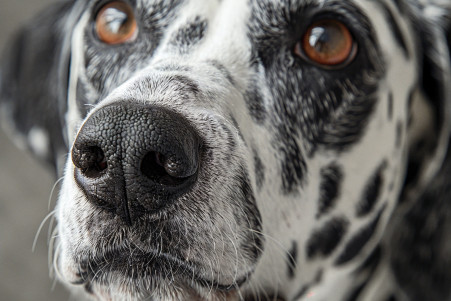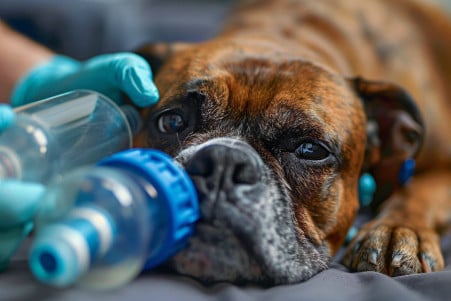Golden Retrievers With Down Syndrome: What You Need to Know
23 March 2024 • Updated 21 March 2024

Down syndrome is a condition that is well-known in humans, but it's also a rare, yet true, diagnosis for our favorite furry friends, golden retrievers - these special pups are known for their challenges and their ability to bring happiness to their families.
Golden retrievers with Down syndrome have an extra copy of chromosome 21, which leads to developmental delays, specific facial characteristics, and potential health problems, including heart conditions. But with the right support and intervention, these sweet pups can live happy, healthy lives as beloved pets.
This article will use the latest scientific studies and expert opinions from veterinarians to help you better understand what it's like to care for a golden retriever with Down syndrome. From learning about their special requirements to their behavior, health issues, and even how they can help their owners, this article will help you better understand and celebrate these special dogs and their indomitable spirit.
Can golden retrievers have Down syndrome?
Genetic Underpinnings: Understanding the Causes
While dogs can't have Down syndrome, they can have genetic conditions that are similar and caused by chromosomal abnormalities and mutations. Geneticist Cathryn Mellersh has spent her career working to find the genetic mutations that cause painful, life-limiting inherited canine diseases such as blindness, epilepsy, and intervertebral disc disease. Her team has found more than 30 mutations in nearly 50 breeds, which has led to more than 380,000 dogs being registered as "hereditary clear" by The Kennel Club.
Genetic testing and responsible breeding are essential to lowering the risk of these diseases. While it's important to continue to include carriers to maintain genetic diversity, inbreeding calculators can help breeders determine if a potential mate is too closely related. Conditions that are similar to Down syndrome in dogs include pituitary dwarfism, congenital hypothyroidism, which is a condition that slows metabolism, and portosystemic shunts, which are abnormal blood vessels that allow toxins to bypass the liver, according to Cornell University.
Genetic conditions can also greatly affect a dog's quality of life, such as skin folds that lead to infections in dogs like Shar-Peis. Thorough testing can help identify dogs that are at risk for these issues so that they can be treated early and so that breeders can make informed, responsible decisions.
How to Care for Dogs With Down Syndrome: Tips and Advice
Caring for a dog with a genetic disorder similar to Down syndrome requires time, patience, and a willingness to provide the specialized care and environment these dogs need. According to Pooch Ooze, dogs with this condition may experience issues with eating, moving, and even behavioral problems due to developmental delays and cognitive disabilities. That's why early diagnosis through genetic testing is so important. It enables dog owners to partner with their vets to create a care plan that works best for their pets.
Adapting the home to make it more accessible and safe for these dogs by removing obstacles and adding safety gates can help prevent accidents and injuries. In addition, a calm, uncluttered environment can help reduce stress. AlphaPaw suggests helping these dogs with eating and moving as necessary and using natural calming solutions to help with any behavioral problems. It may also be helpful to use training methods that take cognitive disabilities into account.
Dog owners of dogs with special needs can get help and advice from online support groups, local support organizations, and breed-specific groups, as noted by Scout's House. These groups can offer advice, emotional support, and even financial aid programs to help with the additional costs of veterinary care and adaptive equipment.
Unconditional Love: Positive Stories and Quality of Life
While the road to caring for a dog with genetic disorders similar to Down syndrome may be difficult, it can also be very rewarding. Updating in 2024: The Heartwarming Journey of a Dog with Down Syndrome tells the story of a family that took in a dog with these special needs. Despite the challenges that came with caring for a dog with these needs, the family talks about the love they felt for the dog and the love the dog felt for them.
As the article points out, it's important to remember to focus on the dog's quality of life and not just their physical and mental differences. The Humane Society of the United States notes that assistance animals, including those with special needs, are covered by the Fair Housing Act, which means that owners can make sure that their pets have the care and support they need.
While caring for a dog with special needs may be more work, many owners find that it's worth it. There are a number of support services and online communities that can help owners find the information and emotional support they need to care for their special needs dog. In the end, these dogs often bring happiness and love that makes the work of caring for them worth it.
Ethical Considerations: Responsible Breeding and Veterinary Research
The breeding of dogs with genetic disorders has sparked a great deal of discussion and ethical concern. A presentation at the WSAVA 2010 conference outlined several important recommendations to help address the problem, including discouraging the breeding of dogs with extreme physical characteristics, using genetic testing to identify healthy breeding stock, and changing breeding strategies in general.
In the UK, the Kennel Club has launched the "Fit For Function, Fit For Life" initiative, which is designed to ensure that all dogs can see, walk, and breathe normally. This has resulted in changes to breed standards, including a requirement that Pekingese dogs have a muzzle to help address brachycephalic concerns. Meanwhile, in the US, genetic registries like the Orthopedic Foundation for Animals (OFA) and Canine Health Information Center (CHIC) help breeders identify and manage genetic disorders.
Veterinarians also have a critical role to play in advising clients about the importance of genetic testing and responsible breeding. As FOUR PAWS International points out, all 50 of the most popular dog breeds in the UK have at least one documented genetic disorder, demonstrating the need for greater transparency and education for breeders and potential dog owners.
While the issue remains controversial, ongoing research and developments in veterinary medicine are offering new possibilities for dogs with genetic disorders. By prioritizing health and well-being over looks and encouraging responsible breeding, we can move closer to a future where all dogs can live healthy lives.
Support and Resources: Making Sure All Dogs Have a Good Life
Organizations like the Handicapped Pets Foundation, Joey's P.A.W., and Hailey's Wheels for Life offer critical financial aid and equipment to help dog owners take care of their special needs pets. These organizations provide wheelchairs, prosthetics, and other mobility equipment to dog owners who can't afford them, allowing dogs with genetic conditions to stay mobile and active.
The Rescued Rollers and Gunnar's Wheels Foundation even have loaner programs that let dog owners borrow equipment when they need it. Meanwhile, organizations like RedRover Relief and The Pet Fund provide grants to help cover the cost of emergency veterinary care.
In addition to financial aid, it's important to build supportive communities that accept and celebrate all dogs. Doberman911.org and Go Wild Hearts offer resources, training, and rehabilitation to help dog owners take care of their special needs pets. Education and advocacy are also important in helping to raise awareness and encourage responsible pet care.
By contributing to these niche organizations and accepting all dogs for who they are, we can make sure every dog, regardless of their physical or cognitive challenges, has a good life.
Conclusion: Celebrating the Resilience of Special Pups
While the challenges of caring for a dog with a genetic disorder resembling Down syndrome can be significant, the unwavering spirit and unconditional love these special pups bring to their families is truly remarkable. By understanding the unique needs and considerations involved, owners can provide the specialized care and accommodations necessary for these dogs to thrive.
Responsible breeding practices, supported by genetic testing and veterinary research, are crucial to addressing the prevalence of these disorders. Equally important is fostering inclusive communities that celebrate the inherent value and worth of all dogs, regardless of their physical or cognitive differences.
Ultimately, the journey of caring for a special needs dog is one of immense reward. With the support of dedicated organizations, online resources, and a compassionate mindset, owners can ensure these resilient pups live fulfilling lives filled with joy and unwavering companionship.


